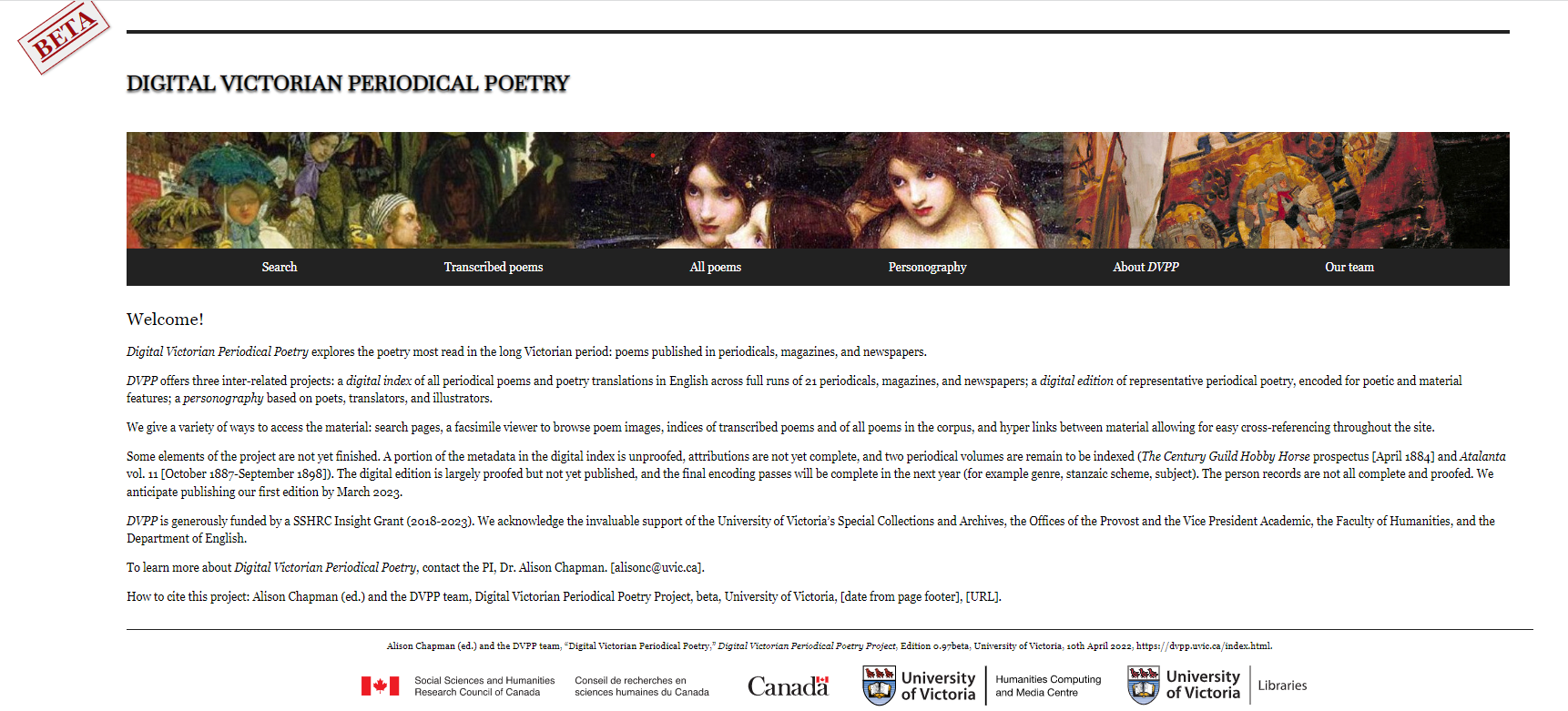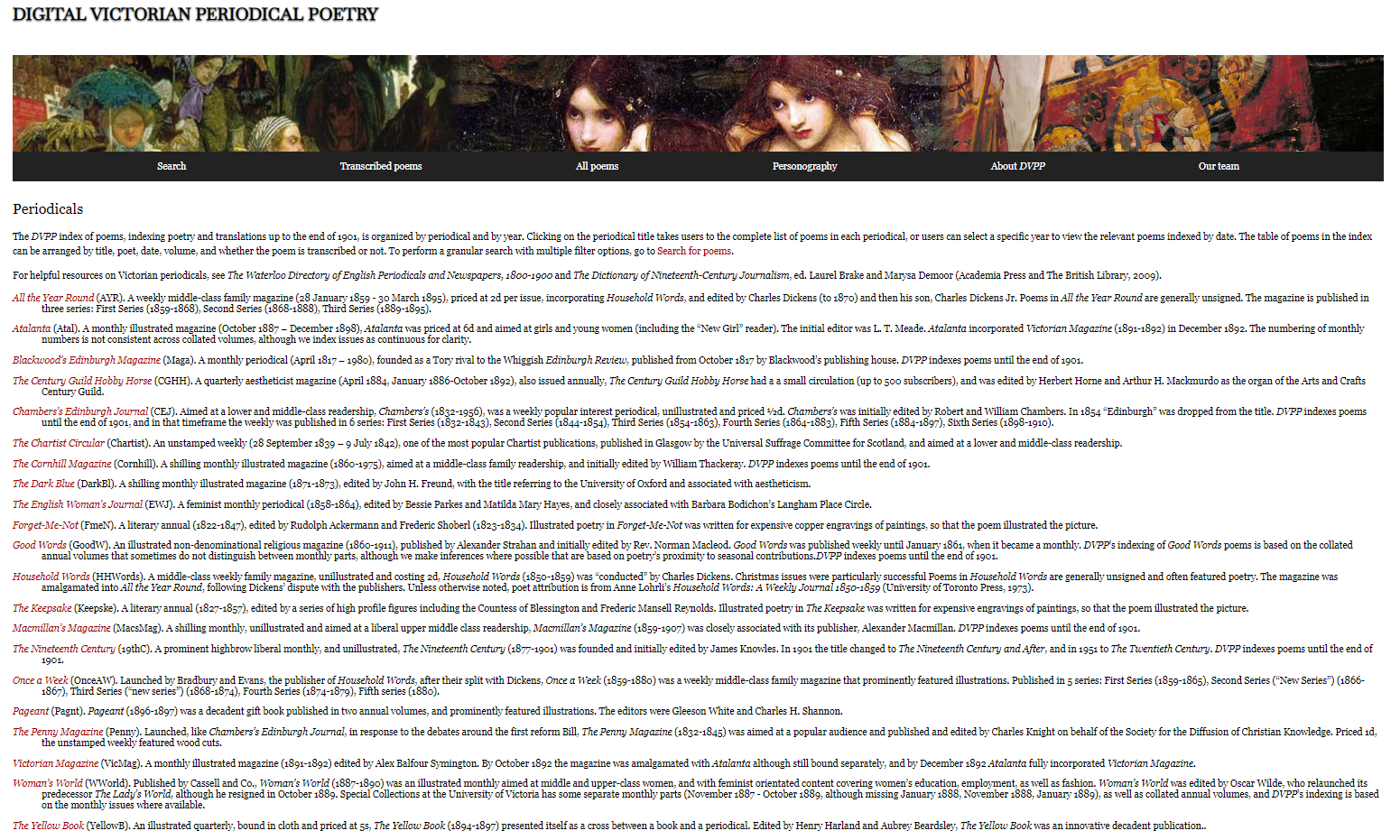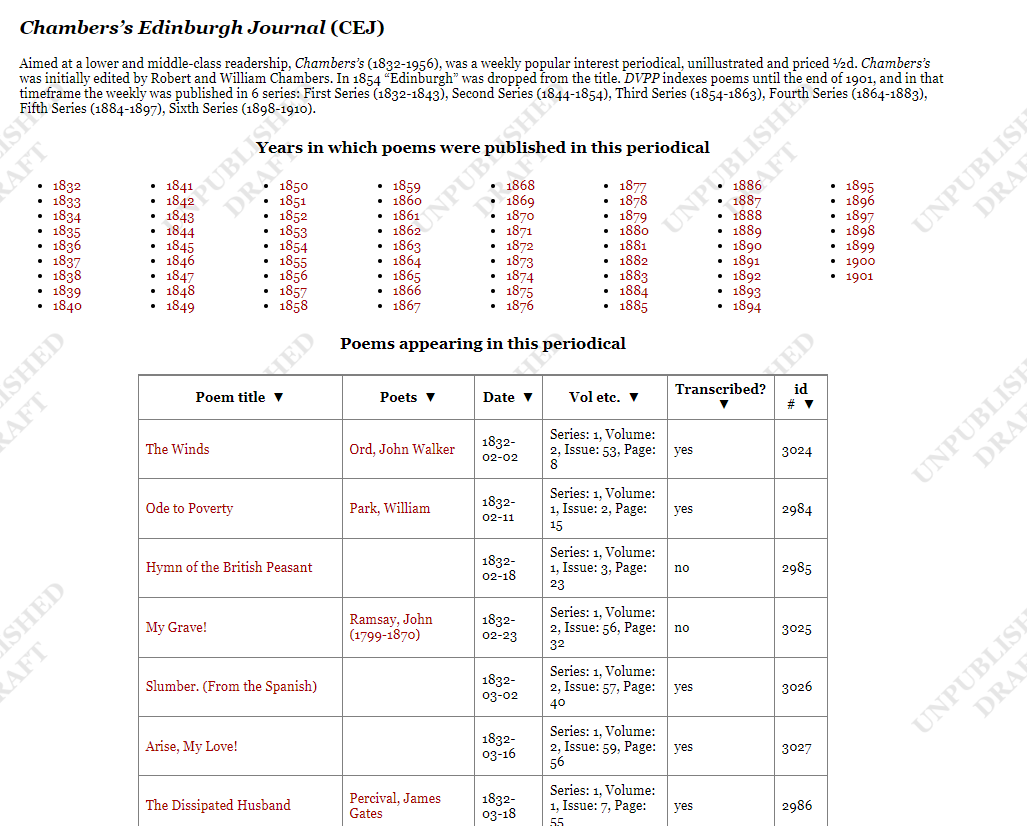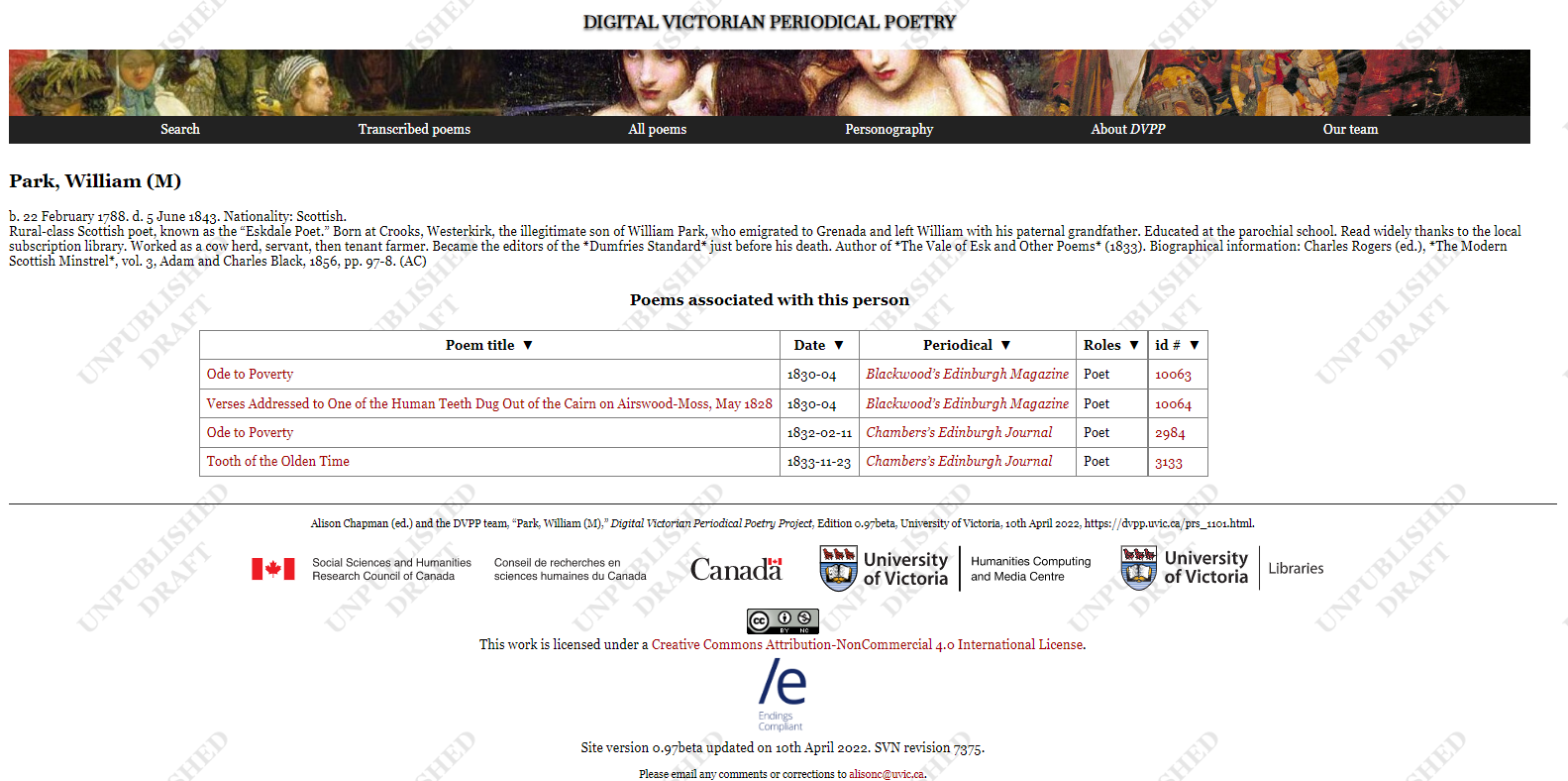by Alison Chapman, University of Victoria, Canada
Diverse literary languages are everywhere in Victorian era periodicals, and in particular featured in the enormous quantity of poems that circulated in serial print. Dialect poems, verse translations of non-standard English poetry, and regional and Four Nations poets, are integral to popular poetry cultures, and form some of the most read Victorian poems. Discovering examples of such poetry and poets in a wide range of periodical print, as well as understanding the extent of the poetry at scale, is not always straightforward despite the various digitization and indexing projects of nineteenth-century literature, because often the metadata that allows for discovery does not exist. In this post I’ll give a case study of an ongoing newly available open access resource, Digital Victorian Periodical Poetry Project (DVPP), which I direct and edit. While the poetry corpus is not directed specifically at locating varieties of literary languages, the search features allow users to find and access non-standard English language poetry and poetry translations, as well as regional and Four Nations poets, at scale.

First, an introduction to the project. DVPP, generously funded by a Social Science and Humanities Research Council of Canada Insight Grant (2018-2023), and for which I serve as PI and editor, has three aims: to uncover, collate, and analyse poetry in Victorian periodicals, which we now recognise as the major poetry publishers of the nineteenth century. Our guiding questions are:
- What was the most read Victorian poetry?
- How do the literary, formal, and material features of periodical poetry challenge scholarly taxonomies of genre, prosody, and print culture?
- How does Victorian periodical poetry offer a more historically nuanced literary history?
DVPP allows users to conduct quantitative analysis of literary texts in order to challenge traditional literary histories, by giving ways of searching evidence of literary change over time (e.g. genre trends, developments in illustration, and poetic devices related to sound [such as rhyme and refrain]). Consequently, DVPP allows claims for long Victorian poetry and poets to be tested at scale, and for investigating research questions through a series of advanced search pages with multiple filters.
We are currently in beta mode, with another encoding pass to make before the first full edition is released by March 2023 (we plan to add tags for poetic genre). DVPP’s periodicals — to date we’ve indexed poetry from 21 titles — come from the University of Victoria’s fabulous Special Collections print holdings, and cover a range of kinds of British serial print, readership orientations, popularity, and period coverage. Our earliest periodical, Blackwood’s Edinburgh Magazine, starts in 1817, and we index periodicals up until the end of 1901. In the context of locating four nations poetry and poets, it’s worth noting that DVPP includes periodicals published (for at least some of their run) in Scotland: in addition to Blackwood’s Edinburgh Magazine, Chambers’s Edinburgh Magazine, The Chartist Circular, and Good Words. In their different ways, these titles circulate Scottish poetry cultures to the British periodical reading public. The other current periodicals, which in different ways engage with varieties of poetic literary languages, are All the Year Round, Atalanta, Century Guild Hobby Horse, Cornhill Magazine, Dark Blue, English Woman’s Journal, Forget-me-Not, Household Words, Keepsake, Macmillan’s Magazine, The Nineteenth Century, Once a Week, Pageant, The Penny Magazine, Victorian Magazine, Woman’s World, The Yellow Book.
DVPP offers three inter-related projects:
- an index of all periodical poems and poetry translations into English across full runs of 21 periodicals, magazines, and newspapers. We provide full metadata, extensive poet attribution research, and page images for all poems and illustrations. We also index full poems in prose contributions. We currently have over 15,500 poems.
- a digital edition of representative periodical poetry, encoded for poetic and material features (such as rhyme scheme, rhyme type), which is currently just over 2,000 poems, based on as close to a statistical sample of poems as we could come up with: poems published at the start of each decade, from 1820 to 1900 (supplemented by some other encoded poems are scattered around the corpus too). The idea is to track any changes over time. Note that, while only a portion of the poems are fully encoded, we add tags about the kind and placement of all poems that are illustrated. We hope to roll out genre and subject matter to all poems in a future encoding pass as well.
- a personography (a collection of person records) based on poets, translators, and illustrators. We have 4,000 person records complete with biographical metadata and notes, with extensive research as well.
All these projects are searchable, with multiple filters to allow for simple and advanced search questions based on the indexing and encoding.
A future grant application will expand DVPP to add additional tags to poets and poems in order to make more features discoverable, including regional poets and dialect poetry. But there are ways to search the current iteration of the project for non-standard English poems and related poets.
Three ways to find information about Victorian literary languages in DVPP:
- Browsing specific periodicals associated with four nations poets and related poetic languages. Certain periodicals are more associated with four nations poets than others. DVPP’s index of all poems allows users to view metadata for poems in specific periodicals, arranged chronologically by year of publication.

Clicking on a periodical title will take you to a page with a table of all the poems published in that periodical, with an index at the top arranged by year of publication. The table is ordered chronologically, but it can be re-arranged alphabetically by poem title or poets’ surname. Clicking on a poet’s name in the table takes you to the person record for that poet, with biographical information and a list of related poems. And clicking on a poem title in the table takes you to the poem record, with bibliographical, editorial, and poetic metadata.
As examples, the screenshots immediately below show the beginning of the periodical page for Chambers’s Edinburgh Journal, which from its launch in 1832 prominently featured Scottish poetry and poets in Scots, and also the person record page for William Park, a Scottish rural-class poet who published in one of the first issues, a page accessible by clicking on his name in the table.


Clicking on the title of the poem “Ode to Poverty,” in either the Chamber’s periodical index page or the third poem listed in the person record page, will take you to the poem record that includes a wide range of bibliographical, literary, and authorial metadata. As this is an encoded poem, the page also gives a transcription and detailed poetic metadata such as the rhyme scheme. The statistics table can be copied and pasted into an excel spreadsheet, with similar data from other poem records, allowing for comparative analysis, in addition to the data for text analysis that we provide in a variety of formats.

The facsimile browser (link through “Search this Site”) gives page images for all poems and any related illustrations, also arranged by periodical title and year. The browser initially opens as a collection of thumbnails, and clicking on an image opens up the image on a full page, which is then linked (by clicking on the poem title above the image) to the poem record page. This function allows for the serendipitous discovery of poems.
- Searching for four nations poets through the “Search for People” page, which allows users to search by nationality. For example, there are currently 157 Irish poets, 383 Scottish poets, and 14 Welsh poets (note that URLs for DVPP searches are stable, and so can be cited in your research). Because of the practise of publishing poems from other eras, not all of these poets will be Victorian, and not all these poets will of course publish in non-standard English, but these searches offer valuable information about the variety of poets in some of the most widely circulating Victorian serial print.

DVPP also allows for searches that add periodical titles as filters. Using Chambers’s again as an example, a search of poems in that periodical written by poets whom we’ve identified as Scottish (this work is ongoing) identifies 542 poets in this category. Chambers’s also regularly featured working-class Scottish poems, and a search for them on the “Search for People” page, adding the keywords “Working-class,” and selecting the filters “poet,” “Scottish,” and “Chambers’s Edinburgh Journal,” results in 30 poets whom we know to fit this category. In contrast, Chambers’s published 48 poets currently known to be Irish, and 2 known to be Welsh. Further research could compare these figures with search results based on the nationality of poets publishing in the other 20 DVPP periodicals, giving a quantitative sense of the extent of four nations poetry. We plan a further grant application to complete the personography, for example using genealogical records to research people for whom we currently have no nationality information, after which these figures will change.
Searching for regional poets as a specific category is envisioned for future versions of DVPP, but currently regional poets can be found by searching for a region as a keyword in the “Search for People” page. Searching for “Yorkshire,” for example, and selecting “poet” as a filter, currently finds 45 person records that mention Yorkshire in the editorial note and, while not all these resulting poets necessarily count as regional poets from Yorkshire, some of them certainly would (such as Susan K. Phillips, Sam Wood, Frederick Charles Heathen, and Richard Wilton). Another search possibility is to use the keyword “dialect” in the “Search for People” page, which again produces results based on person record editorial notes that mentions the word “dialect.” A search for the keyword “Scots” also includes results for poets that write in the Scots language.
- Searching poetry translations into English from a wealth of languages, in the “Search for Poems” page, including the Exmoor dialect, Irish, Manx, and Scots Gaelic. Note that DVPP treats translations as a generous category, including loose translations and imitations, on the principle that the user will filter out any results that are not applicable to them. For example, DVPP currently has 27 poems translated from Scots Gaelic. Particularly interesting are the versions of Scots Gaelic boat songs, such as John Macleod of Morven’s imitation (“The Clansmen,” Good Words, 1875) and the unsigned “Canadian Crofter’s Boat Song” (Blackwood’s, June 1889).

I’d like to thank the DVPP team for their collaborative work, in particular programmer Martin Holmes, from the University of Victoria’s Humanities Computing and Media Centre, for his work developing the search pages.
Works Cited
Chapman, Alison, (ed.), and the DVPP team, Digital Victorian Periodical Poetry Project, beta, University of Victoria, 3 August 2022, https://dvpp.uvic.ca/index.html.